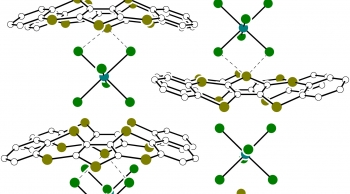
Students working under Dr. Qin will have the opportunity to synthesize novel charge transfer complexes based on sulfur-rich, aromatic, heterocyclic molecules; students will then test these compounds as new organic conductors and superconductors that could help form the basis for superconducting power grids.
Nearly one-tenth of all electrical power is lost as it travels from the electric generators to the final consumers. A superconducting power grid would eliminate this wastage and have tremendous economic and environmental benefits. The best intermetallic superconductors have achieved Tc’s (the temperature at which superconductivity occurs) as high as 100 K, which allows them to operate at liquid nitrogen temperatures, but they are brittle, dense solids—a serious shortcoming for power cables. In contrast, organic materials tend to be lighter in weight and more pliable than inorganics, making them promising components of superconducting power grids.
Although inorganic chemists and physicists have dominated the field of superconductor discovery, superconductivity was first observed in organic molecules in the late 1980s. Despite this fact, this field is under explored, and there are very few classes of organic superconductors. Dr. Qin hopes to further the field and help solve the problem of energy waste.
